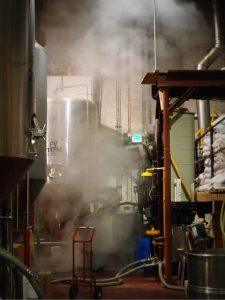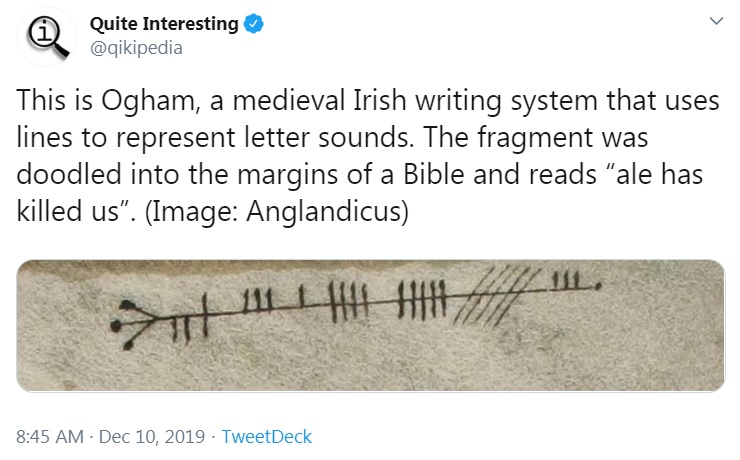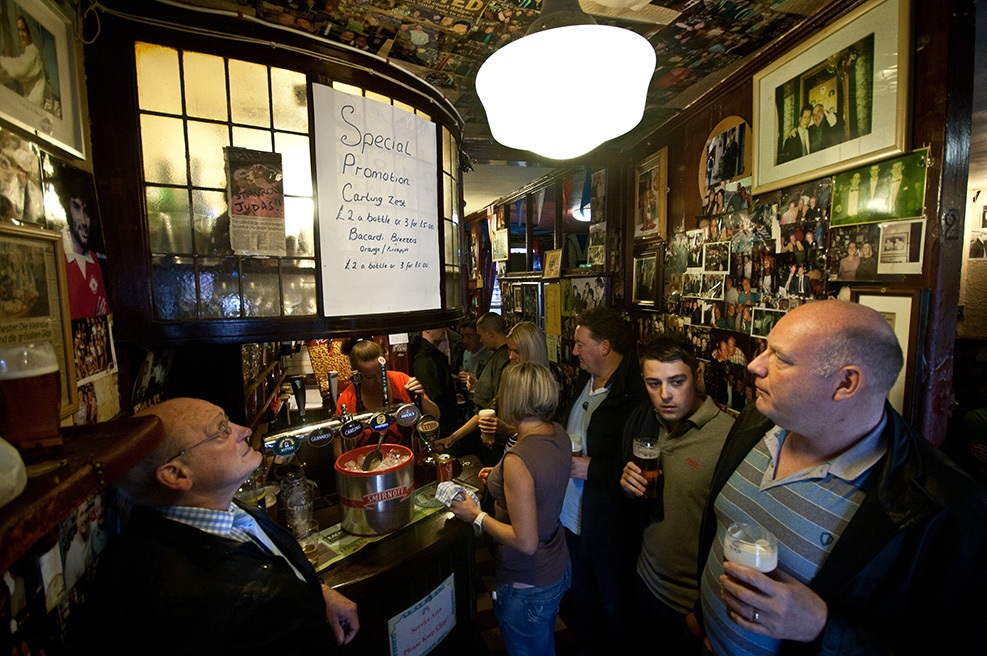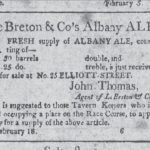 Like you, I am tired. End of year tired. I was tired on Christmas Eve and Christmas Day offers no rest. It feels like the end of a university term and tomorrow we travel. 2019 was a good and busy year – and next week, in my fifty-seventh year, I enter my seventh decade on the planet. I need a rest. So I will be brief this week if only to see if I can get in another nap. Ray of B+B perhaps captured my mood with the tweeted image to the right accompanied by the one word “England.”
Like you, I am tired. End of year tired. I was tired on Christmas Eve and Christmas Day offers no rest. It feels like the end of a university term and tomorrow we travel. 2019 was a good and busy year – and next week, in my fifty-seventh year, I enter my seventh decade on the planet. I need a rest. So I will be brief this week if only to see if I can get in another nap. Ray of B+B perhaps captured my mood with the tweeted image to the right accompanied by the one word “England.”
I had no idea that Dec 23rd was celebrated as Tibb’s Eve in Newfoundland. Fabulous. And Cookie gave tips on how to survive the 25th by being sensible on the 24th.
Jeff at Beervana had a good bit on style evolution. He uses the example of an oat ale from twenty years ago. Somewhere, I have similar notes on a hot IPA from the late 1980s. I am not sure if these illustrate a continuity of evolution or the fact that evolution is a cycle of organic unplanned diversification of traits followed by crisis out of which only a few of the diversifications survive followed by more organic unplanned diversification of traits.
Alistair at Fuggled is reviewing the year in a number of posts, including on his pale beer experiences of 2019.
@oldmudgie noted something endtimsey in the Morning Advertiser‘s round up of the year 2019 in craft. Seems like most popular craft brands in the UK are part of big industrial brewers’ portfolios. Only four years ago, it was something just starting to get confusing. Where will be be in another four?
Gary did us all a big favour with finding and exploring a reference to Labatt IPA from 1867 as yet uncovered in the English discussion:
I searched carefully and could not locate an English version, I believe none was prepared. The author was A.C.P. R. (Phillipe) Landry, whose biography may be read in the Dictionary of Canadian Biography, here. He wrote the study when at Laval University in Quebec City. He was trained in chemistry and agronomy, and was later a noted federal politician, surviving to 1919. I’m not aware that his work has been previously cited in Canadian beer historiography. I have not read every single brewing history resource, so if anyone did raise Landry’s study, I’m happy to know of it.
What thrills me is how it fills a gap in my much suspected continuity of indigenous strong ale in eastern North America from the 1700s to today:
This creates a very useful stepping stone chronologically from NY state strong ales [edit: ie those brought in by the Loyalists] to Albany Ale (1830s) to Labatt (1860s) and Dominion White Label (1890s), to EP Taylor (1930s), to Bert Grant (1980s) and to today’s high test craft IPAs.
This is a different branch from the sequence that goes Albany Ale to Ballantine IPA to Sierra Nevada that Craig wrote about almost four years ago now. The idea that we can link the transmission of experience from generation to generation as part of general culture seems much more reasonable to me than anyone involved in first gen micro brewing having an “a-ha!” out of which the rest came.
And there was a hot blast of unhappiness aimed at the Cicerone server training program, much of which was unhappier than I thought warranted but much of which was also based on some obvious limitations. This is at the heart of objections: “…dropping coin on some private co. that clearly hoards prestige on specious grounds.” Plenty of people responded with the sort of authorized Party Central Communications Committee invocation of craft’s inherent right to silence we are sued to… or, stunningly, rooted for rote memorization as a intellectual pursuit. These, of course, are some of the most depressing things about good beer** and something I attribute to money or rather a lack of money in the complainant’s accounts. One does not bite the hand that feeds you.
My take is that it is always funny when folk compare it to law school* (as if the standards and candidates are equivalent) when the course and others like it isn’t formal education and not a source of new ideas like an academic process. It’s a social media propagated, non-accredited, proprietary, non-peer reviewed program that (given the intellectual property controls) sits outside of the marketplace of ideas. But it is a reasonably affordable and accessible certification for educating front of house staff to a proper standard. Which is good enough. And the basis for a good next step. Best new observation? Robyn’s:
Gonna give a slightly spicy take and add that it’s an industry cert that is both prohibitively expensive and made as a necessity for women and other marginalized folks to get in order to be taken with 1/10th of the seriousness a straight white male homebrewer gets by default.
Me? Until I see the published archive including the thesis of every graduate, I’m not going to look to the program for too many interesting new ideas. But whenever someone serves me a good beer with a reasonably knowledgeable comment, I welcome the skill and assume they are a graduate with some level in their back pocket.
Actually seriously, New Belgium’s owner-employees voted to sell to Kirin despite, as noted two weeks ago, the problems with a profitable authoritarian military branch in Myanmar being in the mix. As one report noted:
Activists are hoping the publicity surrounding the trial will increase the pressure on international businesses like Kirin to sever ties with the Myanmar military. “The profits are being pumped back into the military, helping to fund their operations,” said Mark Farmaner, director of the Burma Campaign UK, which has published a “Dirty List” of about 80 companies linked to the Myanmar military. “Kirin are literally helping to fund genocide.”
Remember: it’s about money. Strike another brewery off my list of interests.
Well, that was more than I intended. As we head toward a new year, don’t forget to check in with Boak and Bailey’s on Saturdays, at the OCBG Podcast on Tuesdays and sometimes a mid-week post of notes from The Fizz as well. And sign up for Katie’s weekly newsletter, too. I’m off to sing some Boxing Day carols and eat leftovers. Happy New Year to you all!
*Yet never oddly engineering of medicine…
**…not just my view…

 Yuletide. Its been busy so far this month but after one last late evening meeting for work tonight I think I might be sliding into Yule proper. As I mentioned a few weeks ago, the days of the Christmas Yuletide Hogmanay Kwanzaa and Hanukkah Beery photo contest may be well past us but the archives go on and on. To the left is
Yuletide. Its been busy so far this month but after one last late evening meeting for work tonight I think I might be sliding into Yule proper. As I mentioned a few weeks ago, the days of the Christmas Yuletide Hogmanay Kwanzaa and Hanukkah Beery photo contest may be well past us but the archives go on and on. To the left is  It’s not often that I get to headline the weekly update with something so.. so… unbeery – but is beer ever really that much removed from politics? Consider this photo to the right that
It’s not often that I get to headline the weekly update with something so.. so… unbeery – but is beer ever really that much removed from politics? Consider this photo to the right that  Barry in Germany posted an afternoon’s worth of photos of
Barry in Germany posted an afternoon’s worth of photos of 


